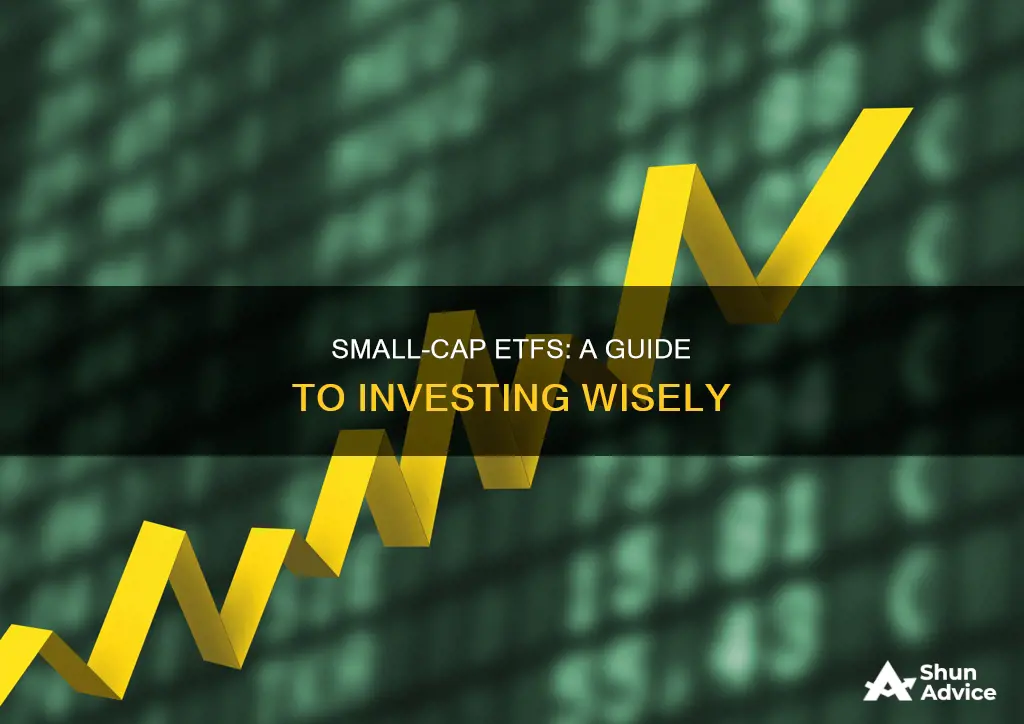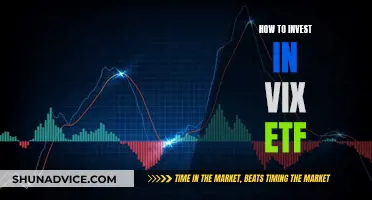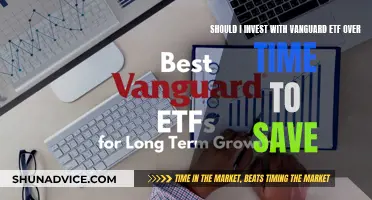
Small-cap ETFs are a great way to invest in the market's smallest companies, which often remain overlooked by investors. Small-cap stocks typically have a total value of a few hundred million dollars to a few billion dollars, which is small compared to the stock market, where market capitalisation can hit a trillion dollars. Small-cap ETFs are an attractive investment option as they provide exposure to some of the market's fastest-growing companies at a low cost and with less risk than buying individual stocks. However, small-cap stocks are riskier and more volatile than large-cap stocks as they rely more on debt and are sensitive to interest rates. Small-cap ETFs also tend to be more volatile than funds holding larger, more established companies.
| Characteristics | Values |
|---|---|
| Definition | Exchange-traded fund that invests in companies with a value of less than $2 billion |
| Performance | Varies depending on the ETF |
| Diversification | Provides diversification to a portfolio with exposure to large or medium-sized companies |
| Risk | Smoother overall risk than investing in individual small-cap stocks |
| Returns | Potentially higher returns than large-cap stocks |
| Volatility | More volatile than funds that hold larger, more established companies |
| Investment strategy | Actively or passively managed |
| Investment objective | To invest in the market's smallest companies |
| Advantages | Easy way to buy a "basket" of small-cap companies, attractive returns, low cost, quick to add to an existing portfolio |
| Disadvantages | Most successful companies will be sold as they outgrow the small-cap category, lack of broad diversification, more volatile than larger companies |
What You'll Learn

What is a small-cap ETF?
A small-cap ETF is an exchange-traded fund that invests in companies with a total value of shares outstanding between a few hundred million dollars and a few billion dollars. While this may sound like a lot, these companies are considered small when compared to mid-cap or large-cap companies, which start at $10 billion. Small-cap ETFs are an attractive investment option as they allow investors to buy a basket of smaller companies at a relatively low cost, without the same risks associated with investing in individual stocks.
Small-cap ETFs are a great way to gain exposure to the small-cap segment of the market, which often remains overlooked by investors. They provide an easy way to buy the small-cap "haystack" rather than search through it for high performers. Small-cap stocks can offer higher potential returns than large-cap stocks, but they are also riskier and more volatile due to their smaller size and limited financial resources.
The Russell 2000 index is a commonly used benchmark for small-cap stocks, tracking approximately 2,000 of the smallest companies by market cap in the US. The S&P SmallCap 600 index is another important index, which includes 600 small-cap US stocks from the S&P 1500 Composite Index, with an unadjusted market cap of $600 million to $2.4 billion.
Some examples of small-cap ETFs include:
- IShares Russell 2000 ETF (IWM)
- Vanguard Small-Cap Value ETF (VBR)
- SPDR S&P 600 Small Cap Growth ETF (SLYG)
- Schwab U.S. Small-Cap ETF (SCHA)
- Invesco S&P SmallCap Momentum ETF (XSMO)
ETFs on Etrade: A Beginner's Guide to Investing
You may want to see also

Top-performing small-cap ETFs
Small-cap ETFs can be a great addition to your investment portfolio, but they come with some risks. Here are some of the top-performing small-cap ETFs to consider:
Invesco S&P SmallCap 600 Revenue ETF (RWJ)
This ETF is based on the S&P SmallCap 600 Revenue-Weighted Index, which re-weights the stocks of the S&P SmallCap 600 Index by a company's revenue. As of November 29, 2024, it had a year-to-date performance of 19.3% and a five-year historical performance of 18.4%. The expense ratio for this ETF is 0.39%.
Avantis U.S. Small Cap Value ETF (AVUV)
The Avantis U.S. Small Cap Value ETF invests in small-cap companies across various industries, focusing on those with strong profitability metrics, particularly operating cash flow relative to book value, and attractive valuations. As of November 29, 2024, it had a year-to-date performance of 18.7% and a five-year historical performance of 16.7%. With an expense ratio of 0.25%, it offers a relatively low-cost option.
Invesco S&P SmallCap Value with Momentum ETF (XSVM)
This ETF tracks the S&P 600 High Momentum Value Index, which consists of 120 stocks with the highest scores on momentum and value factors. As of November 29, 2024, it had a year-to-date performance of 11.9% and a five-year historical performance of 14.6%. The expense ratio for this ETF is 0.37%.
Invesco Dorsey Wright SmallCap Momentum ETF (DWAS)
The DWAS ETF is based on the Dorsey Wright SmallCap Technical Leaders Index, which includes stocks with strong momentum. As of November 29, 2024, it had a year-to-date performance of 23.8% and a five-year historical performance of 14.5%. However, it has a higher expense ratio of 0.60% compared to some other options.
Invesco S&P SmallCap Momentum ETF (XSMO)
This ETF follows the S&P SmallCap 600 Momentum Index and includes 120 stocks with the highest "momentum scores." As of November 29, 2024, it had a year-to-date performance of 29.3% and a five-year historical performance of 14.2%. The expense ratio for this ETF is 0.39%.
Pacer U.S. Small Cap Cash Cows 100 ETF (CALF)
The Pacer U.S. Small Cap Cash Cows 100 ETF includes the top 100 stocks in the S&P SmallCap 600 based on their free cash flow yield. While its year-to-date performance as of November 29, 2024, was only 0.1%, its five-year historical performance was 14.1%. It has an expense ratio of 0.59%.
Dimensional U.S. Small Cap ETF (DFAS)
The Dimensional U.S. Small Cap ETF is an actively managed fund with a goal to achieve long-term capital appreciation while minimizing federal income taxes on returns. It has been an ETF since 2021 but has been managed since December 1998. The ETF has an annualized total return of 9.4% since its inception, nearly 0.9% higher than the Russell 2000. The top sectors represented are financials, industrials, and consumer discretionary stocks. The expense ratio is not mentioned.
SPDR S&P 600 Small Cap Growth ETF (SLYG)
The SPDR S&P 600 Small Cap Growth ETF tracks the performance of the S&P 600 SmallCap 600 Growth Index, focusing on small-cap stocks with above-average growth tendencies. The ETF has a mix of growth and value stocks, with its top sectors being industrials, consumer discretionary, and technology. Over the past 10 years, it has provided an annualized total return of 10%. The expense ratio is not mentioned.
WisdomTree Emerging Markets SmallCap Dividend Fund (DGS)
This ETF provides exposure to dividend-paying small-cap stocks in emerging markets, with Taiwan, India, and South Korea as the top three countries represented. It has a high turnover rate of 51% in the last 12 months and an above-market dividend yield of 3.3%. The expense ratio is not mentioned.
IShares MSCI International Small-Cap Equity Factor ETF (ISCF)
The iShares MSCI International Small-Cap Equity Factor ETF is a passively managed ETF that focuses on small-cap companies from developed markets exhibiting momentum, quality, value, and low volatility. Since its launch in April 2015, it has provided an annual total return of 6.7%. The ETF has a mix of small and mid-cap companies, with the top sectors being industrials, consumer discretionary, and financials. The expense ratio is not mentioned.
Please note that the performance metrics and other details provided are as of November/December 2024 and may not be current. It is always advisable to conduct your own research and consult with a financial advisor before making any investment decisions.
A Guide to Investing in ASX 200 ETFs
You may want to see also

Are small-cap ETFs a good investment?
Small-cap ETFs can be a great addition to your investment portfolio, but they do come with some risks.
Small-cap ETFs are a type of exchange-traded fund that invests in the market's smallest companies through small-capitalization or small-cap stocks. Small-cap ETFs allow you to buy a "basket" of these smaller companies, which can offer higher potential returns than large-cap stocks.
Small-cap stocks may sound small, but they're not usually that tiny. The total value of all their shares outstanding is typically between a few hundred million dollars and a few billion dollars. That's small for the stock market, though, where market capitalization can hit a trillion dollars.
Small-cap ETFs can provide attractive returns, but there are some drawbacks. They allow you to purchase a diversified portfolio of smaller companies for a relatively low cost. They also don't require the extensive research that investing in individual companies does and can be added to your overall portfolio quickly to boost exposure to the small-cap market. Many of today's most successful companies started as small caps, and small caps can generate high returns as they grow and become larger businesses.
However, one drawback of investing in small-cap ETFs is that as the most successful companies grow, they move on from being considered small-cap, and many funds are forced to sell them to stay in line with their investment objectives. You also won't get the broad diversification that comes with other funds, so if an economic development negatively impacts the small-cap market, you won't be protected. Small-cap funds also tend to be more volatile than funds that hold larger, more established companies.
Small-cap ETFs are an attractive way to invest in some of the market's fastest-growing companies at a low cost without the same risks of buying individual stocks. But like all investments in the stock market, they aren't without risk and other drawbacks.
ETFs and Insurance: A Secure Investment Strategy?
You may want to see also

Best small-cap ETFs of 2024
Small-cap ETFs are a great way to invest in some of the fastest-growing companies in the market at a low cost without the same risks as buying individual stocks. However, they do come with some risks and drawbacks.
Small-cap ETFs are exchange-traded funds that invest in the smallest companies in the market through small-capitalization or small-cap stocks. Small-cap ETFs allow investors to buy the small-cap "haystack" rather than search for high performers. While small-cap stocks may sound small, they are usually valued between a few hundred million dollars and a few billion dollars, which is considered small in the stock market.
Top-Performing Small-Cap ETFs
- Nuveen Small Cap Select ETF
- First Trust Small Cap Growth AlphaDEX Fund
- First Trust Multi-Manager Small Cap Opportunities ETF
- Invesco S&P SmallCap Momentum ETF (XSMO)
- Fidelity Enhanced Small Cap ETF
- Motley Fool Small-Cap Growth ETF
- SPDR S&P SmallCap 600 ESG ETF
- Dimensional U.S. Small Cap ETF (DFAS)
- Avantis U.S. Small Cap Value ETF (AVUV)
- SPDR S&P 600 Small Cap Growth ETF (SLYG)
- WisdomTree Emerging Markets SmallCap Dividend Fund (DGS)
- IShares MSCI International Small-Cap Equity Factor ETF (ISCF)
- Pacer US Small Cap Cash Cows 100 ETF (CALF)
- Invesco S&P SmallCap 600 Revenue ETF (RWJ)
- Invesco S&P SmallCap Value With Momentum ETF (XSVM)
- Invesco Dorsey Wright SmallCap Momentum ETF (DWAS)
- Invesco S&P SmallCap 600 Pure Value ETF (RZV)
Small-cap ETFs can provide attractive returns if purchased at sensible prices. They allow investors to purchase a diversified portfolio of smaller companies at a relatively low cost. They also don't require the extensive research that investing in individual companies does. Small caps can generate high returns as they grow and become larger businesses.
However, one drawback of small-cap ETFs is that as companies grow, they may move on from being considered small-cap, and funds are forced to sell them to stay in line with their investment objectives. Small-cap funds also tend to be more volatile than funds that hold larger, more established companies.
A Beginner's Guide to Investing in ETFs with Fidelity
You may want to see also

How to find the best small-cap ETF for you
Small-cap ETFs can be a great addition to your investment portfolio, but they come with some risks. Small-cap stocks are considered riskier than large-cap stocks because they are smaller and have fewer financial resources. However, they can offer higher potential returns.
- Define your investment goals and risk tolerance: Before investing in small-cap ETFs, it is important to understand your financial goals and how much risk you are comfortable taking. Small-cap ETFs can be more volatile than funds that hold larger, more established companies.
- Look for diversification: To manage risk, look for small-cap ETFs that invest in a diverse range of companies across different sectors and industries. This will help reduce the impact of any single company's performance on your investment.
- Consider the fund's performance: When evaluating small-cap ETFs, look at their historical performance over the past five years or more. Compare the returns with relevant benchmarks, such as the Russell 2000 index for U.S. small-cap stocks.
- Evaluate expenses and fees: Consider the expense ratio and management fees associated with the ETF. These fees can eat into your returns over time, so look for funds with lower expenses.
- Research the fund's strategy: Different small-cap ETFs use various investment strategies, such as focusing on growth, value, or momentum stocks. Choose an ETF whose strategy aligns with your investment goals and risk tolerance.
- Consider actively managed ETFs: While most ETFs are passively managed, following a specific index, some small-cap ETFs are actively managed by fund managers. These funds may be able to outperform the market but come with higher fees.
- Monitor the fund's holdings: Keep an eye on the ETF's holdings to ensure they meet your investment criteria and that the fund remains well-diversified. Small-cap ETFs may need to sell successful companies as they grow larger, so be aware of how this may impact the fund's performance.
- Dimensional U.S. Small Cap ETF (DFAS)
- SPDR S&P 600 Small Cap Growth ETF (SLYG)
- Avantis U.S. Small Cap Value ETF (AVUV)
- Invesco S&P SmallCap 600 Revenue ETF (RWJ)
- IShares Core S&P Small-Cap ETF
- Vanguard Small-Cap Value ETF
Invest Wisely: BTCC ETF Strategies for Beginners
You may want to see also
Frequently asked questions
Small-cap ETFs are exchange-traded funds that invest in the market's smallest companies through small-capitalization or small-cap stocks. Small-cap ETFs allow you to buy a "basket" of small-cap companies, reducing the risk of investing in individual small stocks.
Here are some of the best-performing small-cap ETFs as of December 2024:
- Vanguard Small-Cap ETF (VB)
- VictoryShares US Small Cap High Div Volatility Wtd ETF (CSB)
- Invesco FTSE RAFI US 1500 Small-Mid ETF (PRFZ)
- iShares ESG Aware MSCI USA Small-Cap ETF (ESML)
- SPDR S&P 600 Small Cap Growth ETF (SLYG)
- Avantis U.S. Small Cap Value ETF (AVUV)
- Invesco S&P SmallCap Momentum ETF (XSMO)
Small-cap ETFs can provide attractive returns, but they also come with higher risks and volatility. Investing in small-cap ETFs can give you a diversified portfolio of smaller companies at a relatively low cost. Small caps can generate high returns as they grow and become larger businesses. However, as companies grow and move on from being considered small-cap, funds are forced to sell them to stay within their investment objectives. Small-cap ETFs also provide less diversification than other funds, so you won't be protected from economic developments that negatively impact the small-cap market.







